|
|
|
Sort Order |
|
|
|
Items / Page
|
|
|
|
|
|
|
| Srl | Item |
| 1 |
ID:
113326


|
|
|
|
|
| Publication |
2012.
|
| Summary/Abstract |
The 17th Conference of the Parties (COP17) had been anticipated as the 'African COP', not only due to the African venue but also due to the opportunity it would afford African countries - with South Africa at the helm - to steer the debate on a global climate change regime. With the conference now over, lobby groups, international organisations, negotiators, observers and commentators alike have been taking stock of its outcome. Despite the litany of developmental and security implications of climate change, COP17 got underway with little hope that much might actually be achieved. In light of the discouraging condition of the global economy, with leading developed economies suffering financially, states were hardly in a mood to be making concessions that would impact their fiscal health. Nonetheless, an agreement was reached. Questions remain, however, about the significance of the outcome of the African COP for the world at large, but ultimately also for Africa.
|
|
|
|
|
|
|
|
|
|
|
|
|
|
|
|
| 2 |
ID:
113320
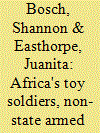

|
|
|
|
|
| Publication |
2012.
|
| Summary/Abstract |
Armed conflict on the African continent has witnessed increasing recruitment of child soldiers, often at the hands of non-state armed groups. Unfortunately this practice continues unabated in the face of legal obligations prohibiting the recruitment of child soldiers under international humanitarian law, and international and regional human rights law. While international condemnation of the practice has led to attempts to increase the minimum age for recruitment to 18, a disjuncture persists between the legal obligations states sign up to, and the actual enforcement of these prohibitions at a domestic level.
International criminal law jurisprudence emanating from the Special Court for Sierra Leone and the International Criminal Court is being monitored closely, as these courts seek to enforce the prohibition in all armed conflicts, and against both state actors and non-state armed groups. International humanitarian law only protects child soldiers who have been unlawfully recruited. In this piece, the authors take a closer look at what amounts to unlawful recruitment in light of customary international humanitarian law, since this body of law also binds non-state actors, even without further criminalising legislation at a domestic level. Moreover, the article briefly explores whether a child can ever void this protected status by volunteering to participate directly in hostilities.
|
|
|
|
|
|
|
|
|
|
|
|
|
|
|
|
| 3 |
ID:
113324
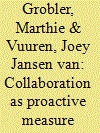

|
|
|
|
|
| Publication |
2012.
|
| Summary/Abstract |
The international scope of the Internet and wide reach of technological usage requires cyber defence systems to intersect largely with the application and implementation of international legislation. One of the problems associated with the technological revolution is that cyber space comprises complex and dynamic technological innovations to which no current legal system is well suited. A further complication is the lack of comprehensive treaties facilitating international cooperation with regard to cyber defence. The result is that many countries will not be properly prepared or adequately protected by legislation in the event of a cyber attack on a national level.
The article investigates this problem by touching on the influence that cyber defence has on the international position of the government. The article addresses the principles of cyber security and cyber warfare acts, and briefly touches on cyber security collaboration efforts for South Africa. The authors are of the opinion that Africa does not follow a coordinated approach in dealing with cyber security, and that the various structures that have been established to deal with cyber security are inadequate to deal with issues holistically. To work towards such a co ordinated approach, it is suggested that specific interventions be developed to address cyber crime. This approach should create and maintain a partnership or collaboration between business, government and civil society. The authors are of the opinion that unless these spheres of society work together, Africa's efforts to ensure a secure cyber space may be compromised.
|
|
|
|
|
|
|
|
|
|
|
|
|
|
|
|
| 4 |
ID:
113321
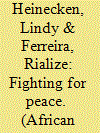

|
|
|
|
|
| Publication |
2012.
|
| Summary/Abstract |
In Africa, most of the present conflicts are civil, intra-state wars where belligerent groups use guerrilla tactics to achieve various political, economic or ideological objectives. The atrocities and the effect of these on-going wars on innocent civilians, human suffering, poverty and development are beyond comprehension. Not surprisingly, the majority of current peace operations are in Africa, with more than 70 countries contributing forces to these conflict zones. On the continent, South Africa has come to assume a leading role in peace operations and is now a major troop-contributing country to UN and AU missions. In the past 11 years, the South African National Defence Force (SANDF) has taken part in no fewer than 14 peace missions. This article provides a brief background of the conflicts in Burundi, the Democratic Republic of Congo (DRC) and Sudan, the different United Nations (UN) and African Union (AU) mandates under which peacekeepers had to operate as well as their objectives, and the extent of South Africa's involvement in the various missions. In the last section, the major challenges, that these operations have posed are highlighted.
|
|
|
|
|
|
|
|
|
|
|
|
|
|
|
|
| 5 |
ID:
113322
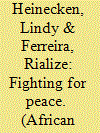

|
|
|
|
|
| Publication |
2012.
|
| Summary/Abstract |
This article reports on the experiences of South African military personnel who have been deployed on peace missions in Burundi, the DRC and Darfur/Sudan. These missions are extremely challenging for peacekeepers given the complex, vicious and protracted nature of the conflicts in these countries. This has placed heavy demands on individuals participating in field operations, not only because the operations are often dangerous and unpredictable, but also because of the conditions under which they have to serve and the resources available to them. In this study, the experiences of 94 SANDF personnel who have been deployed primarily in Burundi, the DRC and Sudan are analysed in relation to their operational experiences; the challenges posed by the rules of engagement; shortcomings in their training; and their readiness and interaction with other role players. The findings of this empirical research provide a real sense of how peacekeepers at the tactical level experience these deployments from a uniquely South African perspective.
|
|
|
|
|
|
|
|
|
|
|
|
|
|
|
|
| 6 |
ID:
113323
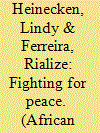

|
|
|
|
|
| Publication |
2012.
|
| Summary/Abstract |
This article focuses on the psychological dimensions of deployment in peace operations. The first section examines whether South African military personnel find their deployments in these missions satisfying. The concomitant aim is to determine what motivated military personnel to serve in these missions where they were required to help, protect and save mostly civilians in countries to which they owe little allegiance. The focus then shifts to how peacekeepers cope with the stress associated with these missions, not only in terms of operations but also lengthy separations from family, friends and loved ones. The final section addresses issues of adaptation and reintegration upon their return. The findings of this part of the study indicate that peacekeepers serve in peace operations for a number of reasons. Most find the missions satisfying, but there are many stressors that affect their wellbeing and willingness to redeploy.
|
|
|
|
|
|
|
|
|
|
|
|
|
|
|
|
| 7 |
ID:
113325


|
|
|
|
|
| Publication |
2012.
|
| Summary/Abstract |
South Africa's military has, since the First World War, been an oft-used and effective tool in the conduct of South African foreign policy, but this role has not always translated into power for Defence Department principals in its formulation. South African Defence Ministers for most of the country's history have played a minor role in the making of foreign policy; despite a change in this dynamic between approximately 1975-1990, the post-apartheid era has once again seen a diminishment of Defence's power in this arena. This article examines why Defence Ministers have generally been such weak players, with an eye toward disaggregating whether this was a product of interpersonal relationships with Cabinet and - most importantly - the Head of State, or whether this influence (or lack thereof) was more a function of South Africa's international standing. While determining who has influence on this process is difficult given the primacy of the national leader in making foreign policy and a lack of insider accounts by participants in the process, this article relies upon several interviews with participants and knowledgeable observers that help illuminate the process and Defence's role in it.
|
|
|
|
|
|
|
|
|
|
|
|
|
|
|
|
|
|
|
|
|